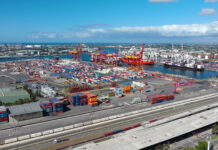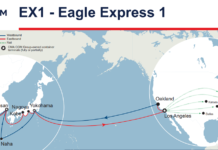
The Maritime and Port Authority of Singapore (MPA) signed a memorandum of understanding (MoU) with Microsoft on 29 July to collaborate in innovative technologies including cloud computing, artificial intelligence (AI), data analytics, robotics, and cybersecurity.
The two partners aim to support the adoption and the development of digital and green solutions for the maritime industry.
MPA and Microsoft will trial the use of AI and digital twins to optimise vessel route planning to enhance safety and reduce emissions in maritime operations, as well as just-in-time arrivals to reduce the turnaround times for vessels in Singapore port.
The two parties will also train early adopters and upskill workers on how to use and implement these solutions for their operations.
Additionally, MPA and Microsoft will explore synergies with MPA’s own cybersecurity capabilities, supporting early detection of cyber threats and enabling companies to undertake timely actions. This will help uplift the cyber capabilities of maritime start-ups and enterprises.
The two organizations will also co-develop new digital solutions or leverage existing Microsoft products to co-develop solutions to support small-and-medium enterprises, by aggregating demand and improving energy efficiency for shipping and port operations. These solutions include using Microsoft’s digital modelling and simulation tools, and analytics capabilities, as well as building spatial models to help inform policy and decision-making on climate risk assessment, mitigation, and adaptation measures.

David Foo, MPA’s Assistant Chief Executive (Operations Technology), commented, “MPA’s collaboration with Microsoft is a significant step towards strengthening Maritime Singapore’s digitalisation and sustainability efforts. MPA is pleased to work with the industry to create digital solutions and applications to address the key challenges in port operations and service delivery, safe navigation of ships, cybersecurity, and sustainability. The collaboration also supports goals for the maritime sector to innovate, reduce business costs and carbon emissions in alignment with the national and international emission targets.”
Lee Hui Li, Managing Director of Microsoft Singapore, stated, “We are thrilled to embark on this transformative journey with MPA, leveraging Microsoft’s advanced technologies in cloud computing, AI, and cybersecurity to drive the digital and green transformation of the maritime industry. Together, we strive to establish new benchmarks in safety, efficiency, and sustainability, as we accelerate innovation for the global maritime sector.”
This cooperation follows MPA-Amazon Web Services partnership announced in April, aiming to develop a maritime AI and Machine Learning (AI–ML) Digital Hub to pilot new AI and generative AI capabilities for maritime use cases, including route and fuel optimisation, carbon emissions accounting, and just-in-time arrivals.





